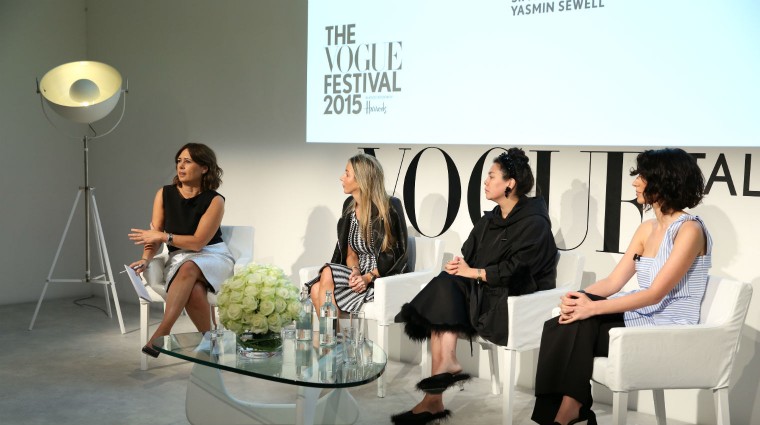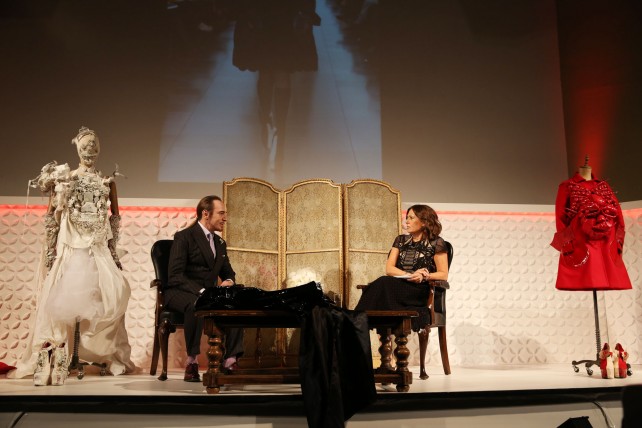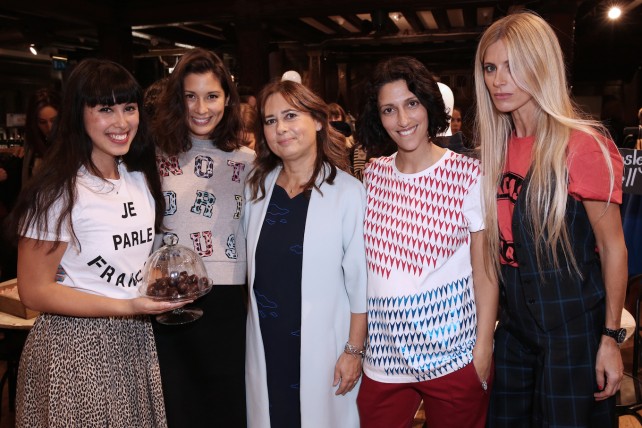Alexandra Shulman (pictured) is an editor at the top of her game after 23 years in editorial charge of Vogue magazine in the UK.
The magazine is synonymous with the world of high fashion and crammed with glossy advertisements for Dior and Chanel, Prada and Louis Vuitton.
In difficult digital times for publishing, Vogue’s print circulation is faring better than most.
“The profitability of the magazine has more than held up. We are very lucky there, but everybody knows that print sales generally are not going to increase at the very least, so we were looking at what we could do,” she explains.
What the Vogue editor-in-chief could do was dream up the idea, and then launch, the Vogue Festival, which this year – it’s fourth – featured top names from the fashion and design industry, such as John Galliano, Christian Louboutin and Jean Paul Gaultier.
The need to move into large-scale events for the first time did not strike like a eureka moment for Ms Shulman, rather it oozed out of the atmosphere around her six years ago.

Panel at Vogue Festival 2015
She was aware of pop stars making much of their money out of touring rather than CDs, and the explosion in numbers of everything from literary and poetry festivals to immersive theatre troupes.
“I realised that where people were prepared to spend their money was on live events,” says Ms Shulman, whose magazine had already launched gala Vogue shopping nights in Oxford Street in 2008.
“The festival we came up with was less of a great money-spinning device because events are incredibly expensive to produce, more a way of taking the idea of Vogue out to more people,” she explains.
It was driven by the realisation that Vogue magazine had never been more famous around the fashion world, yet there were still people who might not consider buying it.
What else could you do with Vogue was the question?
“It was that marvellous thing when you have never done something before, you don’t realise how difficult it is to do. I’m not sure if I’d known how difficult it was I’d ever have come up with the idea,” the editor-in-chief admits.
She wanted a series of talks by leading industry players, but not only talks. It also had to include experience of fashion and beauty, as a way of trying to bring the magazine to life.
A lot of production agencies were interviewed, but the contract went to, and continues to be held by, Timebased Events who have been “absolutely brilliant”, she says.

John Galliano, creative director of Paris-based fashion house Maison Martin Margiela, and Alexandra Shluman at Vogue Festival 2015 (Photo by Darren Gerrish)
Ms Shulman does not outsource the entire event. Timebased handles the nuts and bolts of building the site, while the Vogue editorial team keeps control of brand values and concentrates on central issues, such as signing up the best speakers, many of whom come from Ms Shulman’s contacts book.
The Vogue editor confesses, however, that even now she hasn’t got it exactly how she wants it.
“I wanted to reflect the status of the magazine and would like it to have more of an element of debate about the issues confronting people in fashion,” says Ms Shulman, who has journalism in her DNA. Her father Milton Shulman was theatre critic of the London Evening Standard for 40 years, and her mother is the feature writer and author Drusilla Beyfus.
“I’d like to do more about fashion and art, fashion and film, and it would be good to do fashion and politics, all of those kind of bigger issues,” says Ms Shulman, who concedes she also has to be realistic.
People, she acknowledges, turn up to hear the big speakers and it’s the big names, such as designer and film director Tom Ford, who will fill a 900-seat venue to overflowing, rather than serious debate.
“I would like to have a bit more of an edge and be a little bit less about the personalities, and more about the issues. It’s a fine calibration, but it can probably be done,” says Ms Shulman, who has made her position clear on some of the more contentious issues facing the magazine and the industry.
She won’t use models under the age of 16 and, although she wants larger models, she doesn’t mean normal-sized women, just “larger thin women”.
People buy Vogue and attend the Vogue Festival to see “a kind of version of fashion and style” – an element of fantasy – rather than a portrait of their own lives. There’s Good Housekeeping for that sort of thing, she says.
The point is to engage people who are interested in the idea of Vogue – it’s another way of consuming Vogue, another way of taking part in the world we create
At this year’s Vogue Festival, Ms Shulman interviewed designer Galliano on stage for one of his few appearances following his acrimonious departure from Dior after he made anti-Semitic remarks.
But for her, the highlight was less dramatic. “We took over the Royal College of Art for the first time as a venue and turned it into the world of Vogue, and Alexa Chung did a very good interview with designer Olivier Rousteing which was hugely successful,” says Ms Shulman.
The festival, which attracted more than 7,000 people this year, made a profit although the Vogue editor says it would have been a lot easier to make the same amount of money by selling a few more pages of advertising.
“The point is, yes, for it not to lose money, but to engage people who are interested in the idea of Vogue – it’s another way of consuming Vogue, another way of taking part in the world we create,” she says.
The hope is that the festival is likely to make people more loyal to the magazine and attract younger potential readers.
“It [the festival] is seen as a good and successful event. You have to keep bringing in new things, not just events. You just have to keep on reinventing the wheel, don’t you?” says Ms Shulman.
She is speaking just after having the first meeting for the 2016 Vogue Festival with partners Harrods.
“We are planning to make it larger than it was this year and very special because it is our centenary year,” says Ms Shulman, who believes that events are going to become more important for publications, for marketing and public relations reasons, as well as creating a new stream of revenue.
Vogue India, for instance, has an enormous and very lucrative bridal event in a country where fortunes are spent on weddings.
The Vogue Festival is completely separate from London Fashion Week and Ms Shulman would be very wary about diluting the branding by trying to merge with any other event.
The annual fashion night, which is an international Vogue event, is being rebranded this year to Vogue Love, followed by the destination.
On September 12, it will be Vogue Love Regent Street Fashion Night Out, a celebration of fashion in a clearly demarcated space.
“It’s terribly exciting because thousands of people flood in and the shops that put a bit of effort into doing something special say they have made the money back in sales and are really pleased by the new customers it drives in,” the Vogue chief says.

An expectant crowd at Vogue’s Fashion Night Out in London
More events are planned, but they are likely to involve education following the success of Condé Nast master classes at the festival where places at roundtable one-to-eight tuition sessions by experts were instantly snapped up.
Education like the festival, she believes, would be another form of reaching out to new potential readers.
However, the magazine is not about to try to create formal communities of Vogue readers, or members as The Guardian has done, although it first launched a website 15 years ago.

The Hemsley sisters, Alexandra Shluman, Yasmin Sewell and Laura Bailey at Vogue’s Fashion Night Out (Photo by Darren Gerrish)
The publication has 2.5 million Twitter followers, 2.3 million Facebook friends and Vogue.co.uk has 2.3 million unique users a month.
Paper circulation in the second half of last year was 191,163 – a 0.6 per cent year-on-year decline, but apps subscriptions take the total number of paid-for sales above 200,000.
“We have got a lot of people engaged with Vogue and they could be thought of as a Vogue community that is growing, but we are a business and we have to make money, and those things don’t really make money,” insists Ms Shulman, who believes the trick is to provide services that people are prepared to pay for.
Before Vogue Love Regent Street and Vogue Festival 2016, she has an event of her own to look forward to on July 2, the publication of her second novel, The Parrots.
It is, she explains, about London and the effect of foreign money coming into the city.
“It’s also about desire and deception. It’s a Vogue world, but not about the fashion industry,” says Ms Shulman with a laugh.
A CAREER IN FASHION JOURNALISM
Educated at Sussex University, where she read social anthropology in the mid-seventies, Alexandra Shulman wrote a freelance article for Vogue on “Sussex style”. It was her introduction to a career in journalism and to the magazine she would one day head. But first she worked in the music industry with Hannibal Records and Arista. She started out in publishing as secretary to the editor of Over 21 magazine and continued to write as a freelance, eventually landing a job with Tatler in 1982 and subsequently becoming features editor. In 1987 she was headhunted and joined The Sunday Telegraph as woman’s page editor, later becoming deputy editor of the paper’s 7 Days magazine. Then came an offer from Vogue to become features editor. Two years later, in 1990, she was promoted to editor of GQ magazine. In 1992, when Liz Tilberis left the post, Alexandra was offered the editorship of Vogue. In addition she has written columns for The Daily Telegraph and Daily Mail, as well as publishing a novel, with a second due out in July. She is the longest serving editor in British Vogue history.




